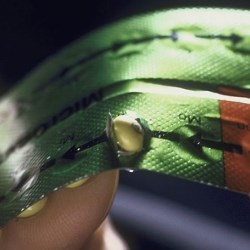If this is your company, CONTACT US to activate Packbase™ software to build your portal.


They look like the real deal. The product name rings a bell. The logo of a well-known pharmaceutical company is printed prominently on the label. However, appearances can be deceiving. Find out how you can recognize fake drugs.
In reality, these packages are often manufactured by criminal organizations that want to make a profit at the expense of the patients’ health. They create fraudulent brands to make their fake drugs look like real ones. Neither the quality nor efficacy of these supposed medicines is guaranteed.
To protect products from being counterfeited, Bayer uses various technical methods – similar to anti-counterfeiting features on bank notes. These identifying features help patients recognize original products.
Example: Testosterone Products
For certain medical conditions, such as impotence or bone loss, patients benefit from a therapy with testosterone. Bodybuilders use testosterone as a doping agent to accelerate muscle growth and to boost their performance (so-called “anabolic agents”). Because users seldom have a prescription, they buy the product through dubious channels. This is extremely risky. “Medicines” that are available from illegal pharmacies or in the darknet are rarely tested or licensed. Bayer has observed that not only fake versions of their products are being sold, but increasingly, “bogus” medicines are being offered that have never been produced by the company, or any other real pharmaceutical manufacturer. Taking testosterone incorrectly can lead to serious side effects. These range from cardiovascular disease to liver cancer.
How Do I Protect Myself from Counterfeit Drugs?
If you are not familiar with a medicine, play it safe. Make sure the drug is actually manufactured by the company named on the label. A quick search on Drugs.com can provide a first clue on whether to trust this medicine or not. You can also ask the manufacturer whether it produces this medication.
Be wary if acquaintances, whether online or in person, recommend certain medicines, or offer to sell these to you. Certain drugs are not available over the counter for a reason. Buying such medications on your own could make you liable to penalties, and taking such drugs could potentially cause serious health damage.
How Do I Recognize Fake Medications?
Real medicines must go through strict control processes. Before they are approved, manufacturers must prove the product’s efficacy in several studies. Of course, scammers using brand names or company logos fraudulently do not adhere to these procedures.
Be especially careful of the following:
- Low prices
Fake brands or bogus medicines do not undergo development or tests lasting several years. Scammers sell their products for prices that seem too good to be true, and usually focus on this aspect in their advertisements. - Fake Bayer cross
Be wary of products that depict the Bayer cross in a distorted form or with unusual color patterns. Compare the labels with Bayer products that you know. - Familiar-sounding product names
Some scammers invent names for their products that closely resemble the products you know and trust. By entering these names in a search engine, you will quickly find out whether a manufacturer actually makes the drug! - Herbal extracts that are supposedly free from side effects
Natural ingredients can also cause side effects. If a manufacturer claims that their product is especially safe and potent, it is probably a “bogus” product. Worst case, it contains a dangerous cocktail of active agents.










